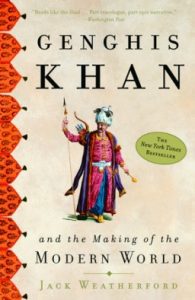



Instead, he accentuates the positive changes the Mongols, led by a visionary Genghis Khan, brought to the vast territories they conquered, if ever so briefly: the use of carpets, noodles, tea, playing cards, lemons, carrots, fabrics, and even a few words, including the cheer hurray. No business-secrets fluffery here, though Weatherford does credit Genghis Khan and company for seeking “not merely to conquer the world but to impose a global order based on free trade, a single international law, and a universal alphabet with which to write all the languages of the world.” Not that the world was necessarily appreciative: the Mongols were renowned for, well, intemperance in war and peace, even if Weatherford does go rather lightly on the atrocities-and-butchery front. “The Mongols swept across the globe as conquerors,” writes the appreciative pop anthropologist-historian Weatherford ( The History of Money, 1997, etc.), “but also as civilization’s unrivaled cultural carriers.”


 0 kommentar(er)
0 kommentar(er)
